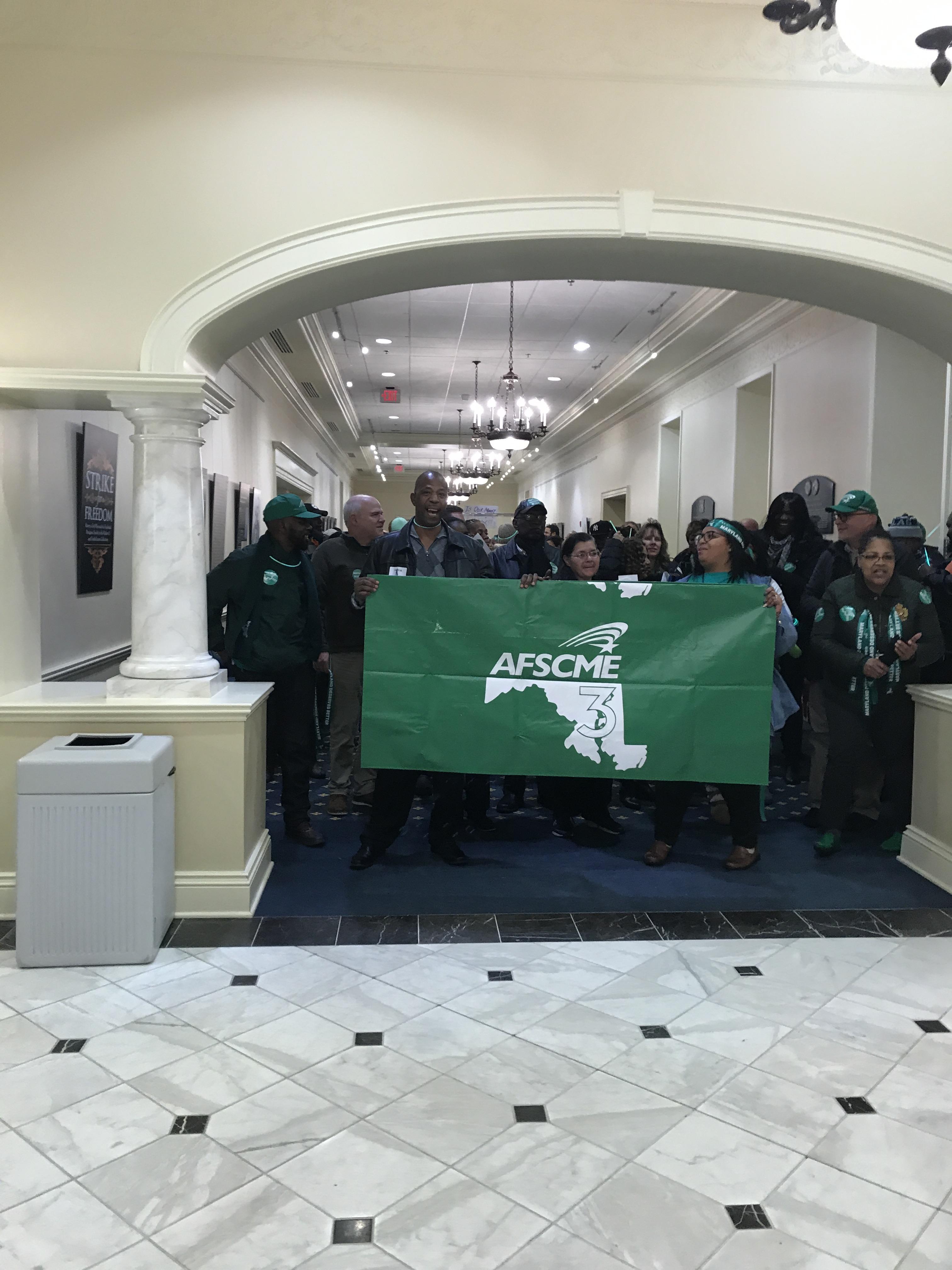2020 Legislative Agenda
AFSCME COUNCIL 3: MARYLAND DESERVES BETTER
Every year, the General Assembly must pass a budget during the 90 day legislative session. Each legislator can also put forth legislation which must pass through a committee system and voted on by each chamber. AFSCME members have a variety of tools and events scheduled to make our voices heard. Read more about our legsialtive agenda below!
To achieve our legislative agenda, we have to amplify our voices and get as many fellow employees to Annapolis this session as possible. We will be having a series of Council Wide Mobilizations and Lobby Nights for specific issues. Each agency will also have Budget Hearings during the day where members can take the opportunity to testify on mismanagement of funds and other concerns in their agency.
Click below to download the full calendar here and a printable version of the legislative agenda for your bulletin board!
- Calendar: https://www.afscmemd.org/system/files/2020_updatedcalendar_0.pdf
- Legislative Agenda: https://www.afscmemd.org/system/files/afscme_2020cpg6.pdf
- RSVP for any event: https://www.afscmemd.org/afscme-3/calendar-events
Identifying Impacts and Solutions to the Maryland Staffing Crisis
Safer Workplaces
In the prisons, juvenile facilities, hospitals and other institutions that engage Marylanders in crisis, the risk of physical injury is a constant – and growing – issue. Appropriate levels of staffing, and better trained and paid security, would go a long way to create safer work environments. But Maryland also needs relevant policies developed and executed that create safer workplaces, including identifying and addressing hazards, tracking incidents, and performing regularly scheduled safety trainings.
Understaffing and Competitive Wages
Low compensation levels have impeded the ability of the State to recruit and retain employees. State employees earn significantly less than comparable positions in the private sector or other jurisdictions. Maryland is a wealthy state and ranks fifth in personal income. But a national study found that the average State salary ranks twenty-ninth in the United States when factoring in the cost of labor. The state needs to:
- enhance entry level salaries for state employees;
- provide cost-of-living and step increases, including the January 2020 1% COLA Governor Hogan is unjustly
- withholding from AFSCME 3 members despite the General Assembly’s appropriation;
- utilize the surplus in the State Employee Health Insurance Fund to provide a premium holiday;
- address pay inequities in state agencies including but not limited to forensic pay within the Maryland Department of Health (MDH); and
- provide double pay for overtime worked in excess of twenty hours a pay period.
Better Personnel Policies
Truly savvy employers create environments where workers not only are appropriately paid, but also feel valued and understood. In a tight labor market, it’s the little things that tip the scales in a potential employee’s decision. Maryland needs to enhance educational reimbursement and loan forgiveness; implement broad caregiving benefits for the care of children, the elderly or those with a disability; and ensure retirement benefits reward long-term commitment, starting with a return to a fulsome prescription drug benefit. Work schedules need to match the rhetoric of creating family friendly practice. And finally, supervisors need to be better trained in leadership and accountability in ways that employees find fair, impartial and emotionally rewarding.
Improved Hiring Practices
Today’s job market requires agility and flexibility to hire the best and most qualified. Maryland’s hiring processes are cumbersome, bureaucratic, and filled with unnecessary obstacles that serve as deterrents to potential employees. Streamlining processes while ensuring safety and security would help make Maryland a more competitive employer. Hiring practices need to be updated to ensure accuracy in job descriptions, virtual elimination of contractual hiring for permanent job titles, and accurate payroll accounting.
Increased Legislative Oversight
Last year, through budget narrative, various agencies within the State of Maryland were required to report on their efforts to hire staff or reduce caseloads. As of today, multiple agencies have not submitted their reports.
- The Department of Parole and Probation has missed a November 30th requirement for reporting on caseloads
- The Maryland Department of Health has declined to use funding set aside to create working committees of management and union representatives to issue a report on workplace violence
- The Division of Corrections (DOC) has not submitted a report due on Nov 15th regarding a plan to fill vacancies
- DOC also did not use $7 million specifically fenced off by the Legislature for retention raises to CO’s because of the
- Governor’s refusal to release the funding
If the Executive Branch continues to ignore the requests of the Legislative Branch, the General Assembly should take steps to enhance their capabilities to perform true oversight functions. For example, efforts could be undertaken to engage more frequently and directly with departments’ Offices of Inspector General. In addition, there is a proposed constitutional amendment which would provide greater authority to the General Assembly to reallocate budgeted money to priorities deemed of greater worth. This would shift Maryland’s separation of powers to more reflect other states.

